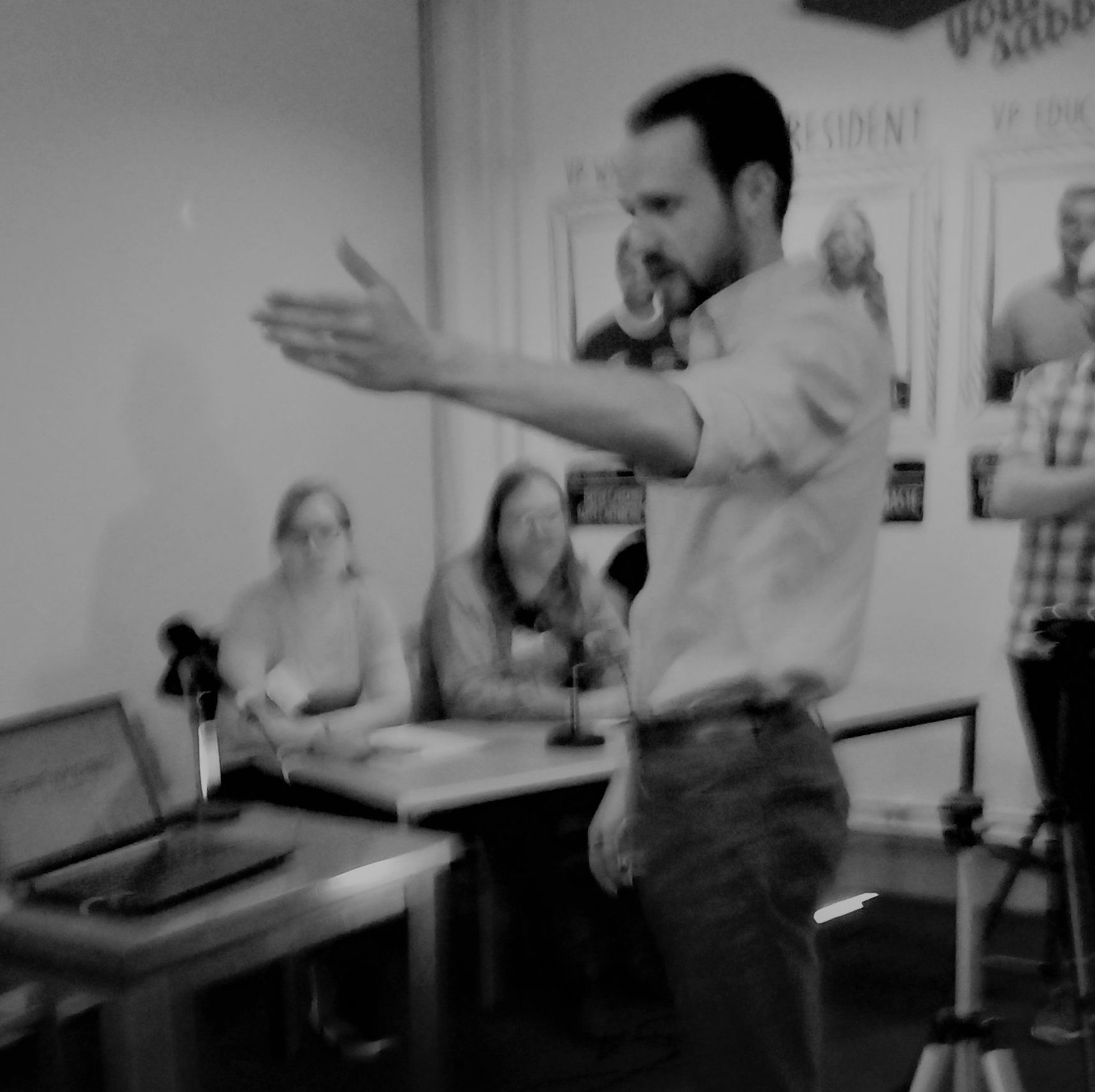Alternative Sociologies of Religion: Through Non-Western Eyes
In this interview, recorded at the SocRel 2017 Annual Conference, Professor James Spickard talks about his latest project. Starting with a critique of North American sociology’s approach to religion, Spickard emphasises how our concepts of religion are historically grounded, arising from a particular time and place. How can we remedy this, and how can we look at our own concepts more critically and reflexively? Spickard presents three examples of how religion might be understood differently – from the point of view of Confucianism, Navajo religion, and the work of Arab scholar Ibn Khaldoun – and shows how these different approaches can alter our perspectives. What can Confucianism show us about North American church congregations? How can the work of Ibn Khaldoun affect our understandings of race and ethnicity? Building on ideas such as Raewyn Connell’s Southern Theory, Spickard explores how researchers could begin to move toward a ‘world-conscious sociology of religion’.
Beyond ‘Faith-Based Organizations’: Religion and NGOs in comparative perspective
Produced by R. Michael Feener
Religious NGOs play significant roles in service delivery, community organization, advocacy and mediating flows of information and resources across the globe. Their religious inflections can both enhance the effective reach of particular projects and complicate the already fraught policy environment in which NGOs operate.While policy frameworks influence the kinds of activities that religious NGOs are able to undertake and aim to govern practice, the way this takes place in context is an empirical question. In this interview, we talk with Erica Bornstein about her studies of religious giving and social activism in India and Africa, and what the results of her research contribute to our understanding of the complex configurations of ‘Faith-Based Organizations’ across diverse religious contexts.
Since the turn of the twenty-first century, there has been a remarkable surge of interest among both academics and policy makers in the effects that religion has on international aid and development. Within this broad field, the work of ‘religious NGOs’ or ‘Faith-Based Organisations’ (FBOs) has garnered considerable attention. This series of podcasts for The Religious Studies Project seeks to explore how the discourses, practices, and institutional forms of both religious actors and purportedly secular NGOs intersect, and how these engagements result in changes in our understanding of both ‘religion' and ‘development’. These interviews with leading scholars working on the topic across diverse contexts in Asia (and beyond) have been conducted by Dr. Catherine Scheer & Dr. Giuseppe Bolotta of the National University of Singapore’s Asia Research Institute. Our work on this has been generously supported by a grant from the Henry Luce Foundation.
Hyper-Real Religion, Digital Capitalism, and the Pygmalion Effect
In this interview, recorded at the SocRel 2017 conference in Leeds, Professor Adam Possamai discusses the rising popularity of ‘Hyper-Real religion’ – a category encompassing Jediism, Matrixism, and other movements taking influence from popular culture. Situating hyper-real religions within the contemporary context of digital capitalism, Possamai discusses how changes in the market can also affect religion, with particular reference to the ‘pygmalion effect’: the blurring of boundaries between popular culture and everyday life. How do these Hyper-Real religions relate to the hegemony of capitalism? The interview then turns to Possamai’s more recent work on how religious actors can use technology to fit religion into their daily lives.
Muslims, NGOs, and the future of democratic space in Myanmar
Produced by R. Michael Feener
The critical situation of the Rohingyas has cast a shadow over Myanmar’s process of democratization and drawn attention to some aggressively un-civil sectors of this Buddhist majority country’s Muslim minority population. In this interview with Melissa Crouch, we will talk about her recent research on Myanmar’s Muslim population and about the role played by the international community - and by religious NGOs in particular - in relation to the escalation of violence targeting the Rohingyas.
Since the turn of the twenty-first century, there has been a remarkable surge of interest among both academics and policy makers in the effects that religion has on international aid and development. Within this broad field, the work of ‘religious NGOs’ or ‘Faith-Based Organisations’ (FBOs) has garnered considerable attention. This series of podcasts for The Religious Studies Project seeks to explore how the discourses, practices, and institutional forms of both religious actors and purportedly secular NGOs intersect, and how these engagements result in changes in our understanding of both ‘religion' and ‘development’. These interviews with leading scholars working on the topic across diverse contexts in Asia (and beyond) have been conducted by Dr. Catherine Scheer & Dr. Giuseppe Bolotta of the National University of Singapore’s Asia Research Institute. Our work on this has been generously supported by a grant from the Henry Luce Foundation.
Changing Your Story: Assessing Ex-Member Narratives
Ex-member testimony can be a difficult to deal with. Such testimony tends to receive privileged treatment in anti-cult literature, while some academics are prone to be sceptical, even suggesting ex-member testimony is worthless due to the danger of adaption and fiction. So a question remains, how should religious studies scholars deal with such testimony. Do we treat it as fact, fiction, faction, or something else altogether? In this interview at the 2017 British Association for the Study of Religion (BASR) Conference, Breann Fallon chats to Dr George Chryssides about ex-member narratives and the use of such primary sources in the work of religious studies scholars. Issues of identity creation, the alteration of narratives, the use of "faction" as evidence, and case studies from ex-member Jehovah's Witnesses come together in this interview to create a compelling case for a renewed focus on ex-member testimony.
Christian evangelical organisations in global anti-trafficking networks
Produced by R. Michael Feener
American evangelical Christian organizations comprise a significant contingent of the global anti-trafficking movement, and mobilize considerable financial resources around a moral objection to prostitution and sex trafficking. In this interview, we talk with Elena Shih about her ethnography of missionary vocational training rehabilitation projects that train sex workers in Beijing and Bangkok to make jewelry that is sold in the United States, and what this can show us about transnational dynamics of religious activism and non-governmental organizations enacted through the corollary motives of salvific evangelism and social entrepreneurship.
Since the turn of the twenty-first century, there has been a remarkable surge of interest among both academics and policy makers in the effects that religion has on international aid and development. Within this broad field, the work of ‘religious NGOs’ or ‘Faith-Based Organisations’ (FBOs) has garnered considerable attention. This series of podcasts for The Religious Studies Project seeks to explore how the discourses, practices, and institutional forms of both religious actors and purportedly secular NGOs intersect, and how these engagements result in changes in our understanding of both ‘religion' and ‘development’. These interviews with leading scholars working on the topic across diverse contexts in Asia (and beyond) have been conducted by Dr. Catherine Scheer & Dr. Giuseppe Bolotta of the National University of Singapore’s Asia Research Institute. Our work on this has been generously supported by a grant from the Henry Luce Foundation.
Children in New Religious Movements
In the complex and sometimes fraught relationship between New Religious Movements and the wider culture and state, why is it that children are so often a focus? Children are seen as needing special protection and therefore legitimising dramatic state intervention, but are also seen as of particular importance to the future of these movements, and in some more millennial groups, of the world itself. To discuss this, we are once again joined by Susan Palmer, who draws on her vast ethnographic work with such groups to give real-world examples, showing the complexity of the issue. children, it seems, become the central focus of the ideological struggle between the state and the alternative offered by these groups. Who will imprint their ideology onto the children most successfully - and will they resort to violence to do so?
Drawn to the Gods – Religion, Comedy and Animated Television Programs
If you were asked to name the TV programs with the most religious content and references what would you name? 7th Heaven, Supernatural or perhaps Games of Thrones? How many of us would name animated television series such as The Simpsons, Family Guy or South Park? These television series are amongst the most religions on our screens. Indeed, 95% of The Simpsons episodes, 84% of Family Guy episodes, and 78% of South Park episodes contain explicit religious references. These animated comedy shows are critically influential in teaching viewers about religious people and religious institutions. The commentary created via the intersection between humour, satire, and religion in these TV shows, particularly in their own context of America, creates an interesting image of what it supposedly means to be a “good religious American”. In this podcast Associate Professor David Feltmate, author of Drawn to the Gods: Religion and Humor in The Simpsons, South Park, and Family Guy, chats to Breann Fallon about the manner in which these three television shows create a broad commentary on religion for the general public. Feltmate highlights the central place these animate programs have in the proliferation of ideas about the spiritual and the religious, as heavily consumed mediums of popular culture.
Scrape My Barrel! | Mid-Year Special 2017 (with video)
As has now become traditional (how many times must something be repeated to become ‘tradition’? And does this make it ‘religious’?), we are delighted to end 2017 on a more light-hearted note and present our mid-year special gameshow, with added video nonsense. This year, the game was “Scrape My Barrel” — which has absolutely no connection to the popular BBC gameshow “Call My Bluff” — and sees two teams of Religious Studies academics pitted against each other in a battle of definitions, pedantry, creativity, deception, performance and ‘wit’. Quite like any typical RS seminar room, then?
This year, we recorded at the BASR Annual Conference at the University of Chester back in September 2017, and we were delighted to welcome back Jonathan Tuckett to the role of host after permitting him an ill-advised sojourn to the ‘other’ side of the podium in 2016. The teams were made up of ‘established’ RS scholars – George Chryssides, Dawn Llewellyn and Paul-François Tremlett – and ‘up-and-coming’ baristas RS scholars – Vivian Asimos, Liam Sutherland and Amy Whitehead. Each brings their own inimitable style to the table, and certainly provided an entertaining evening for conference attendees (who also double as our fabulous studio audience).
If this gets you in the festive mood, you might want to check out our back catalogue of festive specials:
- 2012 - Only Sixty Seconds!
- 2013 - Nul Point!
- 2014 - Masterbrain!
- 2015 - 14-to-1!
- 2016 - The Unverifiable Truth-Claim!
You can download this podcast, and subscribe to receive our weekly podcast, on donations page?
Thanks to everyone at the University of Chester who facilitated the recording of this episode, to David Robertson for some excellent editing work, to our camera people, to the contestants, the studio audience, and everyone who has contributed to the RSP over the past year. We'll be back in 2018 — thanks for listening!
The Political Relevance of the Sociology of Religion
In this interview with Professor Bryan Turner at the Leeds SocRel 2017 conference, we discuss how the sociology of religion can work to stay central to sociology as a broader discipline, by focusing on how religion functions in contemporary political contexts.
Starting with a consideration of the role religion takes in American political discourse, particularly Trump’s appeals to evangelical communities, Turner discusses how the evangelical ideal of the ‘tender warrior’ can appeal to the blue collar, white, male, working class. This religiously-inflected form of populism is able to bear significant weight on political debates, for example around abortion. This can be compared to the apparent increase of populism in European politics, where the recent success of Emmanuel Macron in France appears to signal that this tide has been halted, for now. Looking even further afield, to Russia and the Philippines, ‘strongman’ politics have become increasingly prominent and relate to religion in different ways: Rodrigo Duterte of the Phillipines has a complicated relationship with the Catholic Church and the Pope, whilst Vladimir Putin allegedly keeps an Eastern Orthodox priest as a counsellor, in an attempt to link Russian identity to Orthodoxy. In many of these cases, religion features heavily in the national insider/outsider debate, further highlighting its salience in contemporary political discourse.
Following the lead of scholars such as Jose Casanova, Professor Turner brings the public and political role of religion into focus. By doing so, he argues, we can push the sociology of religion toward the realms of political theory, international relations, and race relations, thus creating an agenda in which the sociology of religion becomes increasingly mainstream and relevant to the world we live in, rather than fading into a marginal sub-field of sociology.
*This week's podcast is sponsored in part by, Cen SAMM. Through their collaboration with INFORM, they've created a searchable database of millenarian movements available online.*





